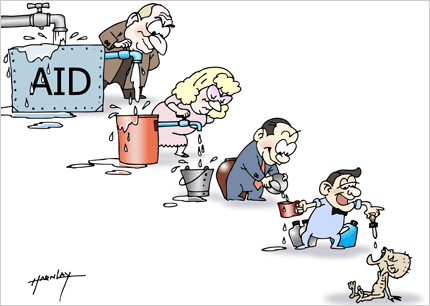« Read other entries… »

Trickle Down Theory May 1st was a day to celebrate workers who organized and demanded fair wages and conditions. It was part of the bottom up movement in our society. Change in our society came from the bottom and as people at the bottom got more money they purchased more and people at the top got wealthy. At some point in the 20th century things got reversed and we developed the trickle down theory. The term has been attributed to humorist Will Rogers, who said during the Great Depression that “money was all appropriated for the top in hopes that it would trickle down to the needy.” Now the term is somewhat pejorative but is still practiced by politicians and the like who claim that if we give tax cuts and benefits to the rich it will trickle down to the poor. It has not worked, as the poor become poorer and the rich become richer, but the theory is still popular today and a politician that talks raising taxes for the common good is doomed.
St. Vincent de Paul and the Society named after him founded by Blessed Frederic Ozanam (1813–1853) is based on the bottom up philosophy and like the Gospel urges to go to the poor and not the rich. Fredrick Oxanam said: ““We must do what is most agreeable to God. Therefore, we must do what our Lord Jesus Christ did when preaching the Gospel. Let us go to the poor.”
The Society of St. Vincent de Paul (SVDP) in Milwaukee County has taken the “trickle down” approach rather than go to the poor. The recent controversy of investing 3.2 million dollar in thrift store in the suburbs rather than “go to the poor” and at a lesser amount purchasing a thrift store in the poorest area of town is a good example. The justification is that building an expensive store in the suburbs, where the need for such a store is less, will generate money that will trickle down to the poor. The local central office of St. Vincent de Paul spends 99% of its two million dollar budget on compensation and operating expenses and less than 1% on direct service to those in need, so money and service will trickle down to those in need. The central office and officers owned four properties, not counting the proposed new thrift store, all purchased with hope that these investments will trickle down to the poor. The Society in Milwaukee pays its top two executives some of the highest salaries in St. Vincent de Paul society’s in the USA in the hope that money will trickle down to poor. The SVDP conferences in Milwaukee send money to the SVDP stores for vouchers given to those in need instead of the store serving the conference.
For example, I just heard of a Vincentian of a conference that was offered a nice table and chairs to serve someone in need. Rather then have the donor give it to the store the person took it and will distribute it directly to someone in need. Giving it to store, controlled by Central office, would mean that he would have to purchase the same table and chairs back with a voucher to give it to someone in need. Money given to Society of St. Vincent De Paul, in one way or another, ends up funding the top and very little trickles down to the poor and needy.
This trickle down theory is why there is a struggle to build the SVDP thrift store in area of great need rather than suburbs. We do not need “trickle down’ economics in our Society. We need the spirit of St. Vincent de Paul, Frederick Ozoman and Jesus to “go to the poor” to provide clothing, beds, stoves and refrigerators to those in need. Going to the poor directly is the way of the Society that has been lost in Milwaukee. Our mission is not going to rich with investments in hope that some money will trickle down to those in need.
Trickle up means giving resources directly to the poor. A 3.2 million investment to those in need for beds, furniture clothing and appliances would make a systematic and revolutionary change that would probably mean some money trickling up to the rich.
Comments
Please send any comments on this post to
. Let us know which day’s post your comments pertain to. If the comments are appropriate we will post them here for you.